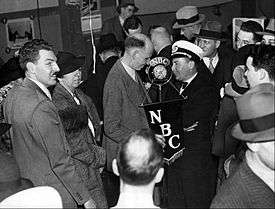Max Jordan
Max Jordan (later, Father Placid Jordan - April 21, 1895 in Sanremo, Italy [1] - November 1977[2]) was a pioneering radio journalist for the NBC network in Europe in the 1930s. Later he became a Benedictine monk.[3][4][5][6][7][8][9][10]

He received a PhD in Religious Philosophy from the University of Jena.[3] He worked for William Randolph Hearst's newspapers in the 1920s.[5]
Europe, 1930s, and the war
He covered many important stories (and had many scoops) in the 1930s when the medium of radio was still relatively new. His first report for NBC was on a 1931 speech by Germany's president Paul von Hindenburg. He also reported on the first Atlantic flight of the Hindenburg in 1936,[6] the Anschluss of Austria in 1938, the text of the Munich Agreement in the same year (giving Hitler Czechoslovakia), the 1940 invasion of Paris,[3] and the 1945 surrender of Japan.[7]
Since 1931 he was domiciled in Arlesheim, Canton of Basel-Landschaft[1]. In 1939 he became a Citizen of the United States[1]
He also hired Martin Agronsky in 1940 to cover the war.[7]
Horten writes that part of Jordan's success was due to his networking with the governments of Germany, Austria, and Hungary, who provided NBC 'privileged use' of their broadcasting facilities.[3]
During the war he worked on NBC's religious shows, which included prayers, bible stories, and a series about military Chaplainship, Chaplain Jim.[3]
Monk
Around 1954 he joined the Beuron Abbey in Germany[4] and became a monk, taking the name of Placid Jordan.[8] He would later argue (in print) against Gordon Zahn's assertions that the Catholic Church had not properly resisted Nazism. Specifically Jordan wrote responses to Zahn's papers regarding the Catholic Church and Nazi Germany.[9] He also wrote a letter to William F. Buckley Jr.'s magazine National Review that was critical of Zhan's book German Catholics and Hitler's Wars.[10]
See also
- Fred Bate
- Edward R Murrow
- William Shirer
Notes
- Staatsarchiv Basel-Stadt Signatur: PD-REG 3a 18095 ()
- "MAX JORDAN (1895-1977) - SSDI"
- "Religion: A Job for Jordan - TIME". Time. time.com. 1943-02-15. Retrieved 2009-11-10.
- "Thomas Merton's Correspondence with: Jordan, Placid, Fr., O.S.B., (Max Jordan) 1895-1977". The Thomas Merton Center, Bellarmine University. Retrieved 2009-11-10.
- Gerd Horten (2003). Radio goes to war: the cultural politics of propaganda during World War II. University of California Press. p. 30. ISBN 978-0-520-24061-2. Retrieved 2009-11-10.
- Edward D. Miller (2003). Emergency broadcasting and 1930s American radio. Temple University Press. ISBN 978-1-56639-993-7. Retrieved 2009-11-10.
- Edward Bliss (1991). Now the news: the story of broadcast journalism. Columbia University Press. pp. 73, 120. ISBN 978-0-231-04403-5. Retrieved 2009-11-10.
- "Billboard". Billboard. Nielsen Business Media, Inc.: 4 1955-01-15.
- "Gordon Zahn Papers (ZHN 131), University of Notre Dame Archives (UNDA), Notre Dame, IN 46556". University of Notre Dame. Retrieved 2009-11-10. Finding aid, ZHN 131
- "Gordon Zahn Papers (ZHN 028), University of Notre Dame Archives (UNDA), Notre Dame, IN 46556". University of Notre Dame. Retrieved 2009-11-10. Finding aid, ZHN 028
External links
- Max Jordan -- NBC's Forgotten Pioneer, by Elizabeth McLeod
- Photos of Dr Jordan from Rex Features